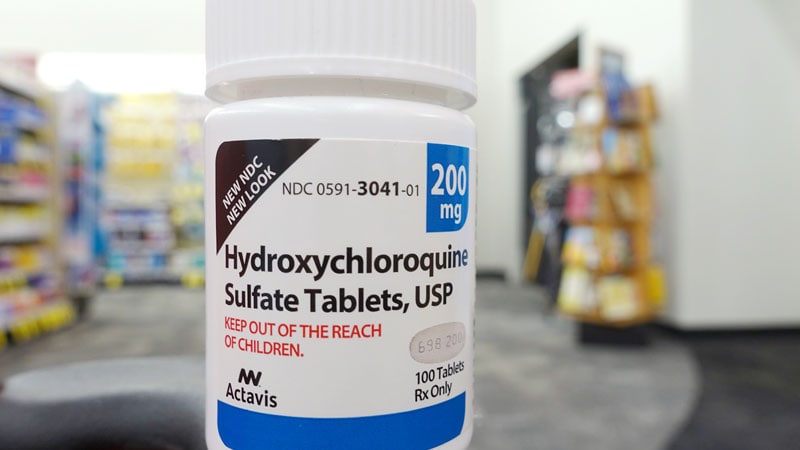Editor’s note: Find the latest COVID-19 news and guidance in Medscape’s Coronavirus Resource Center.
Hydroxychloroquine (HCQ) does not reduce the risk for infection in people exposed to patients with confirmed COVID-19, according to data from a randomized, double-blind, placebo-controlled prevention trial.
The trial enrolled 821 asymptomatic participants from multiple sites in the United States and Canada. David R. Boulware, MD, MPH, from the University of Minnesota in Minneapolis, and colleagues published their findings today in the New England Journal of Medicine.
The results are the latest among several studies to show negative results for HCQ in the setting of COVID-19.
Researchers enrolled adults who reported exposure to someone with confirmed COVID-19 at a distance of less than six feet for more than 10 minutes at home or at work.
Within 4 days of exposure, participants were randomly assigned to receive either placebo or HCQ (800 mg once, followed by 600 mg in 6 to 8 hours, then 600 mg daily for 4 additional days). The primary outcome of the trial was incidence of laboratory-confirmed disease or illness with symptoms compatible with COVID-19 within 14 days.
Overall, 719 of the 821 participants (87.6%) reported a high-risk exposure to a person with confirmed COVID-19, defined as exposure while wearing neither a mask nor an eye shield.
The incidence of new illness compatible with COVID-19 did not differ significantly between those who received HCQ (49 of 414; 11.8%) and those who received placebo (58 of 407; 14.3); the absolute difference was −2.4 percentage points (95% confidence interval, −7.0 to 2.2; P = .35).
However, side effects were more common among those in the HCQ group vs placebo (40.1% vs 16.8%), though no serious adverse reactions were reported.
Writing in an accompanying editorial, Myron S. Cohen, MD, from the Institute for Global Heath and Infectious Diseases at the University of North Carolina at Chapel Hill, notes that a check of clinicaltrials.gov on June 1 found 203 COVID-19 trials with hydroxychloroquine, 60 of them focused on prevention.
He raises the question as to whether the results from Boulware and colleagues should affect ongoing or planned HCQ trials. But given methodological issues with the trial — many identified by the researchers themselves — Cohen concludes that the new data are more “provocative” than “definitive.”
Among his criticisms are that trial methods did not allow for consistent proof of exposure to SARS-CoV-2 or consistent laboratory confirmation that what people were exposed to was a SARS-CoV-2 infection.
“Indeed, the specificity of participant-reported Covid-19 symptoms is low, so it is hard to be certain how many participants in the trial actually had Covid-19. Adherence to the interventions could not be monitored, and participants reported less-than-perfect adherence, more notably in the group receiving hydroxychloroquine.”
He also noted that those enrolled were young, with a median age of 40 years, and had fewer underlying conditions than people more likely to develop COVID-19.
“[T]he potential prevention benefits of hydroxychloroquine remain to be determined,” Cohen concludes.
Boulware and colleagues report several potential conflicts of interest, including receipt of HCQ from Rising Pharmaceuticals for the trial. Cohen reports nonfinancial support and other from Gilead, nonfinancial support and other from Merck, outside the submitted work. Full disclosures are available on the journal website.
NEJM. Published online June 3, 2020. Full text; Editorial
For more news, follow Medscape on Facebook, Twitter, Instagram, and YouTube.
